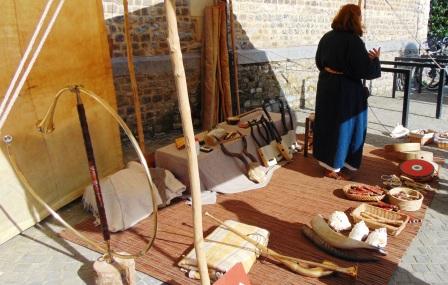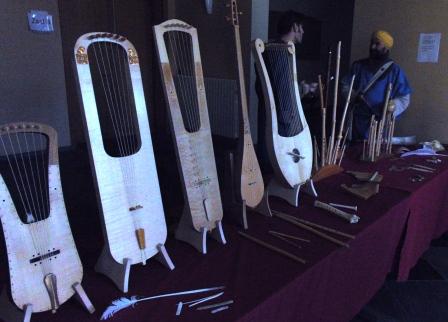Probably a human needs no music to survive. But ‘music softens manners’.
I have almost always the radio on. I like to dance. Music expresses emotions that words (only) sometimes fall short. At a party music is a must. Hearing music can do something with a man.
'Music: the volume does not increase the quality.“(Hugo Tresinie)
Many simple instruments you can make yourself. Of course the tuning is something else. And (good) playing as well.
Wind instruments
 Making a whistle is a piece of cake. Take a straight piece of willow (approx. 25 cm). Cut an angled nozzle. 3 cm from the top you make a straight transverse incision down to a maximum of half the thickness. 1 cm closer to the mouthpiece you make an oblique incision that crosses the previous. The loose segment you take out. 15cm further you make around a deep cut in the bark. Now beat (at least half a minute) with a stick (or handle) everywhere on the bark of the whistle (the first 15 cm). With the lower part in one, and the whistle in the other hand turn and pry the bark carefully. Pull the rear end out. Cut the nozzle and place it back into the bark. The backside can partially be stabbed back. During blow you move it back and forth to change the pitch. If it together with the bark dries out you only have one fixed note.
Making a whistle is a piece of cake. Take a straight piece of willow (approx. 25 cm). Cut an angled nozzle. 3 cm from the top you make a straight transverse incision down to a maximum of half the thickness. 1 cm closer to the mouthpiece you make an oblique incision that crosses the previous. The loose segment you take out. 15cm further you make around a deep cut in the bark. Now beat (at least half a minute) with a stick (or handle) everywhere on the bark of the whistle (the first 15 cm). With the lower part in one, and the whistle in the other hand turn and pry the bark carefully. Pull the rear end out. Cut the nozzle and place it back into the bark. The backside can partially be stabbed back. During blow you move it back and forth to change the pitch. If it together with the bark dries out you only have one fixed note.
Barking succeeds only in the growing season in May (and June).
You can also make a solid whistles. Maybe a recorder (fipple flute) with holes.
You can also use elder wood or bone, and pluck the marrow out (with a hard wooden pin, possibly with a glowing tip, a hot iron, a sharp shard, an arrow).
Or cow parsley (Anthriscus sylvestris), which is already naturally hollow. (Do not confuse it with any other possible poisonous plants!) Or elder.
If you connect tubes of different length sideways, stop tight and with the opening up against each other, you'll get a pan flute.
A flutist with wind problems, is a problem.
A bullroarer, rhombus, or turndun (Bora –Bora)) is usually a blade - shaped carved piece of wood or bone that is thrown around on a string. Before you start to spin, let first turn it around its own axis. This (ceremony) instrument has been used for over 25,000 years. The pitch varies with the rotational speed.
'Self harmonica playing is a higher activity than listening to Bach. “(Godfried Bomans)
“Music before 1985 - softens manners.”(Hugo Tresinie)
Percussion
 Gourd is a collective name for pumpkin -like fruit. Dry skin has a fairly hard shell so they can be used as a jug, cup, bowl, spoon, or rattle. Just put some dry seeds or pebbles in them.
Gourd is a collective name for pumpkin -like fruit. Dry skin has a fairly hard shell so they can be used as a jug, cup, bowl, spoon, or rattle. Just put some dry seeds or pebbles in them.
The convex, hard shell is very strong and also an excellent soundboard!
The guiro or grater is a gourd with grooves cut into the surface. With a light wooden stick is rubbed against the ridges (like a wash board).
Two hardwood slats that you chat together are called claves. They are widely used in Latin music.
The xylophone consists of a series of wooden rods which are suspended at a frame in a tensioned rope. Under each key can hang a resonator to enhance the tone. The pitch depends on, among other things, the length of the key: longer is lower. By scraping away material the tone can be adjusted.
The vibraphone is a xylophone with metal keys.
The gong is a suspended metal disc. Smaller disks make jingles.
A triangle is a suspended, not closed metal triangle that you tap with a stick.
Any metal that you hang up and tap gives sound, especially tubes. You may have to make a chime.
Bongo or drum can be made of wood or earthenware vessels, with or without bottom, or hollow trunks or gourds that are covered with an animal skin.
Stringed Instruments
For the manufacture of modern violin strings are sheep guts (plastic, metal, silk) used. And so no cat-gut, as many people think. Probably due to the mistranslation of the English word for sheep intestine: catgut. Or is it emitted of the sound?
Violin, guitar, harp, mandolin... all cabinets that are spanned by strings. A gourd can be used for this purpose.
“No one should be allowed to play the violin before he can.”(Jim Fiebig)
Harp: naked piano. (Ton O'Horgan)
Harp: piano after taxes. (Arnold H. Glasow)
An instrument means nothing if it is not used. (Katrhyn Caverly Hulme)
